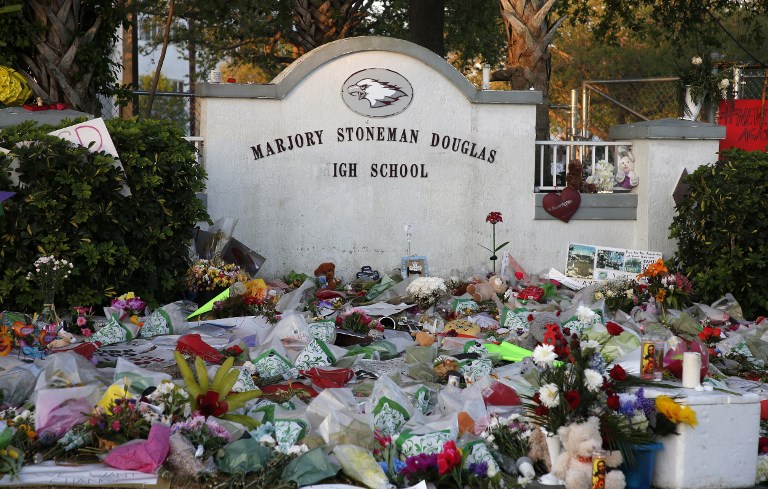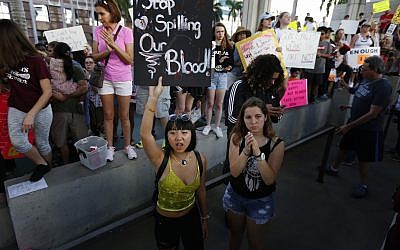"The United States is deeply heterogeneous, and deeply aware of its heterogeneity, and that fosters deep distrust generally."The dreadful event of February 14, when a former student at the Marjory Stoneman Douglas High School in Parkland, Florida, 19 years of age and armed with an assault rifle opened fire in the school leaving 17 students and teachers dead, another 14 wounded, and the entire school body of over 3,000 pupils stunned and traumatized was yet another major multiple murder scene taking place in an American school.
"There is a triple fear that drives [the American gun debate and] every one of these fears is internal to the US, not external. Right-of-center people are afraid of the federal government becoming so powerful that states can’t retain their sovereignty. Among libertarians, there’s a fear that government generally, whether state or federal, will run amok unless citizens can protect themselves from it. The third level is the distrust people have toward each other in the United States."
"The Democratic base [not only Republicans] has the same type of fear, but tries to promote the idea that government is good, or at least capable of being good, so people don’t need to be armed the way governments are armed — you don’t need AR [assault rifles] or tanks, but only the bare minimum for personal defense, like a handgun."
Daniel Correa, professor of law, University of North Texas, Dallas
What set this one apart is that it qualifies as one of the deadliest of its kind in present-day U.S. history. What also sets this one apart is that the students are organized and campaigning for a change in gun laws. What sets this one apart additionally, is that finally, a majority of the public is with them on this critical issue.
 |
| Flowers, candles and mementos sit outside one of the makeshift memorials at Marjory Stoneman Douglas High School in Parkland, Florida on February 27, 2018. (AFP PHOTO / RHONA WISE) |
"Militias" seen as integral to the rights of citizens to react if and when they feel their rights are being infringed. By the state, no less. A holdover of the American revolution.
In Israel, by contrast, the state is viewed with deep trust to protect its citizens. A product of the Holocaust where Jews were primary victims in a genocidal effort to destroy Jewish life entirely throughout Europe in a concerted, state-executed annihilation that took the lives of six million Jews. But it was not the Jewish state that destroyed Jewish life; the Jewish state that rose out of the ashes of the Holocaust was established to save Jewish lives.
In Israel, schools have no need of metal detectors or special door locks on classrooms and teachers are not armed. There are guards. "The guards are there for other reasons, mainly terrorism", explains Amos Shavit, spokesperson for the Ministry of Education, of the guards who are there under the authority of the police where security patrols are carried out around educational institutions throughout the school day. The threat is an external, not an internal one.
In Israel, gun violence is not the order of the day. Privately owned guns are a rarity. Israel's Ministry of Internal Security registers all gun owners. Roughly 260,000 Israelis, representing about 3.5 percent of the population have permits to carry firearms, half of them private citizens, the remainder workers at security companies. There are tight age restrictions on private gun ownership in Israel; civilians must be over 27 years of age to obtain a gun license.
According to research undertaken by an assistant professor of epidemiology at the School of Public Health at the State University of New York Downstate in Brooklyn, homicide rates between Israel and the United States are at great variance. Professor Janet Rosenbaum points out that Israel ranks 81st in the world for per capita firearm ownership; fewer than one in ten Israelis own firearms. For the United States, one firearm exists for every person in the country, giving it the number one ranking globally for per capita firearm ownership.
For Israelis, there is great faith in shared fate and communal solidarity, quite separate from social and political polarities. Israelis view their state as an instrument of collective good reflecting national security and guarantees of personal safety as much as can be expected under the control of the state given outside forces.
A number of strict criteria must be met for Israelis to obtain permits for firearm ownership. The state grants licenses, but permits only one firearm, and should an owner wish to sell, state permission must be sought. The Firearms Licensing Department rejects 40 percent of requests. To qualify for gun ownership Israelis must first meet minimum age requirements, be of sound physical health and mind, and have no criminal record.
Once granted the right to carry a firearm, only 50 bullets may be in their possession at any given time. Before buying new ammunition, the old ones must be used or returned, and then only at tightly regulated shooting ranges which carefully register each sale. The type of firearm permitted is directly related to the purpose of the license where a veterinarian may purchase a gun approved by government for that profession; likewise a hunter's license approves a firearm listed by the Parks Authority.
In Israel, only the people who must be armed, are. Israelis are armed when the state approves they be in response to external threats such as terror attacks. There is no underlying expectation that anyone has the right to bear arms and certainly no right as that enshrined in the American Constitution where the right to gun ownership is inextricably linked to the right to defend against the state, and against one's neighbours.
Any similarities that may exist in the minds of those finding comparisons are strictly superficial.
 |
| Demonstrators at protest against guns on the steps of the Broward County Federal courthouse in Fort Lauderdale, Florida, on Saturday, February 17, 2018. (AP Photo/Brynn Anderson) |
Labels: Crime, Defence, Gun Laws, Israel, Safety, Second Amendment, Security, Threats, United States

<< Home